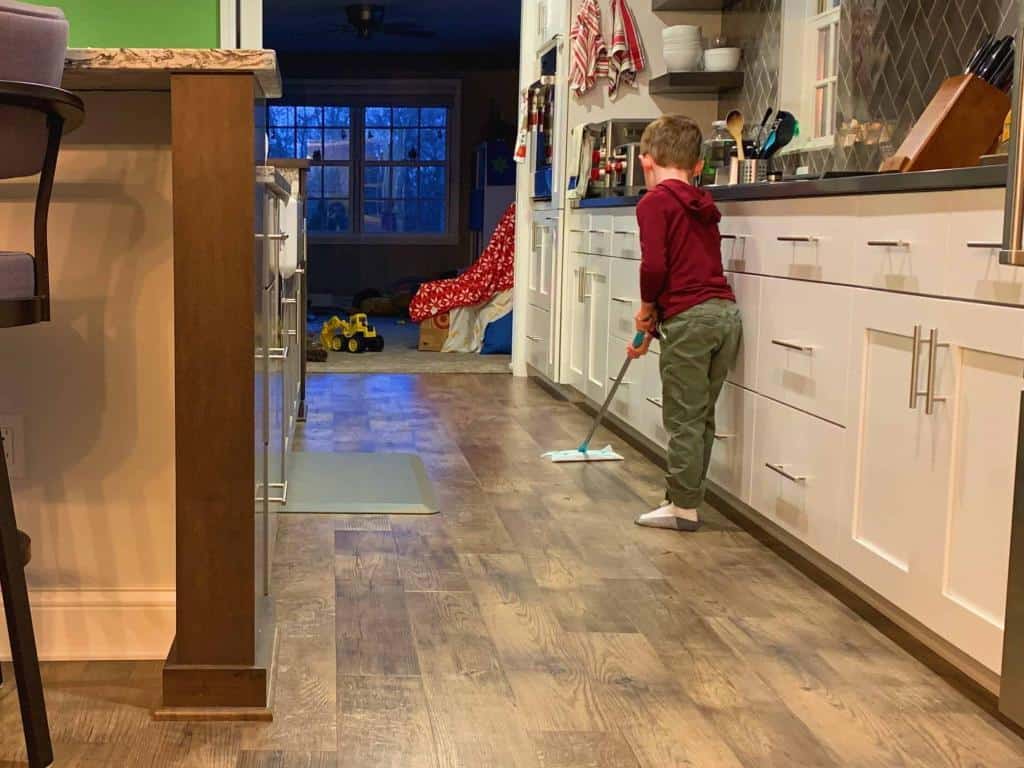If you’re anything like me, you dream about the day when your preschooler can help with the chores. Actually help; not, make a bigger mess, help. But I wind up doing the work myself because I know I can get it done quicker. Or I won’t have to redo the work. OR I won’t have to clean up after they cleaned. The list of reasons can go on and on and on. But, did you know we’re doing ourselves a tremendous disservice?
We’re The Exception
Did you know in almost every non-Western European culture it’s expected that children help out with the chores? And did you know in these same cultures the kids often do the chores without complaining? In fact, they’re usually proud of how helpful they are.
According to experts who study this kind of thing, these cultures all had one thing in common. They started letting their kids help when they were super young. Like toddler young.
The experts also noted that these parents expected their toddlers to make a mess. They expected their toddlers to be inefficient and incompetent. But this shift in expectation wasn’t the only thing they noted.
Toddlers have a natural instinct to want to help. And parents in these cultures seemed to grasp this instinctually. They also understand that the only way to get better at something is to practice. They know their messy, incompetent toddler will not always be this way. Eventually, they’ll turn into a useful chore partner. Most importantly, that desire to want to help will be accompanied by a sense of pride and accomplishment. Which, according to the experts, is what will spur them on to continue being helpful.
How Does That Apply To Us, Though??
Now you may be saying, “That’s great that these other cultures can get their kids to help, but I don’t see that happening here anytime soon.” And to some extent, you may be right. What works in one culture may not work in another.
So why are toddlers so keen to want to help? The experts think it boils down to this… toddlers just want to be around their family and to be included in whatever they’re doing.
When we let our toddler stand on a stool so they can watch us make dinner or do the dishes, we’re telling them that they matter. We’re telling them they are not a distraction or a walking-talking mess-making machine. And the more they watch you do a task, the quicker they learn how to do it.
But for me, the most powerful thing I read was this, “If you tell a child enough times, ‘No, you’re not involved in this chore,’ eventually they will believe you.” (NPR, 2018).
What Concrete Tips Did The Experts Have?
Here are 5 ways we can help turn the uber-“helpful” toddler into an actually helpful middle schooler.
1. Let your kids be a part of as many chores as possible
If your child sees chores as something that can be a social activity, they will be more likely to want to help. They’ll see these tasks as an opportunity to be able to spend time with their family and not as a nuisance.
2. Think about small ways your kids can actually contribute

Make sure the task you give your preschooler is actually something useful. Assigning fake tasks may help you out in the short-term, but it will eventually backfire. Sooner or later, your child will realize they aren’t actually being helpful. Do this enough times and they may no longer want to help because it robs them of the sense of accomplishment that comes from making a real contribution.
3. Always work together rather than splitting up the work
The main driving force behind a toddler’s desire to help stems from being included in a social activity. So if you divide up the work to make things go more quickly, you will lose the collaborative aspect of the chore itself.
4. Don’t force your child to help
Don’t think of getting your kids to do their chores as a matter of being able to coerce them into doing the desired task. Instead, think of it as being able to instill in them the desire to want to help. One way to do this is to use more inclusive methods of asking for help. Make the request a team effort. It all comes back to encouraging the toddler/preschooler desire to want to spend time with their family.
5. Change the way you think about young kids
Yes, kids love to play. But they also want to be helpful. But in cultures where toddlers help if the mom was busy doing a chore and the child came over, they saw it as a desire to help with whatever they were doing. In our culture, we see it as a distraction. We then try and find a way to shoo the child away to some other activity so that we can complete our task. We need to change our mindset to find more opportunities to encourage our kiddos’ natural desire to help. And before we know it, we may find ourselves with a helpful chore partner.
Looking for age-appropriate chores to do with your kids?
Here’s a good breakdown:
Ages 18 months to 3 years old
- Pick up books and toys
- Put clothes in the hamper
- Help unload the dishwasher (take out any sharp utensils first!)
- Help sort and load laundry
- Help put away groceries
- Help clean up spills
- Fill a pet’s food dish
- Water flowers
- Put a sock on their hand and let them dust tables and doorknobs
- Pile books and magazines
Ages 4 to 5 (Any of the above chores)
- Help make the bed
- Bring things from the car to house
- Bring in mail or newspaper
- Help set and clean the table
- Pick weeds
- Water flowers
- Help with leaf raking
- Help with simple tasks in meal-preparation
- Empty wastebaskets
- Wash plastic dishes at the sink
- Pour themselves a bowl of cereal
- Use a hand-held vacuum to pick up crumbs
References
- How To Get Your Kids To Do Chores (Without Resenting It)
- The Art of Dadliness: How to Get Your Kids to Do Their Chores (And Why It’s So Important They Do Them)
- The Chores Kids Can Do, By Age Group
Before you go, check out some of our previous posts!

